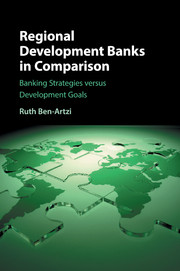Book contents
- Frontmatter
- Dedication
- Contents
- List of Figures
- List of Tables
- Preface
- Acknowledgments
- Introduction
- 1 International Financial Institutions, Development, and Regional Development Banks
- 2 Multilateral Governance: Theoretical and Empirical Underpinnings
- 3 Origins, Politics, and Structure of Regional Development Banks
- 4 RDB Loans and Developing Countries
- 5 Banks or Development Agencies?
- 6 Political and Economic Constraints, Principals and Agents, and Prospects for Development
- Conclusion: Future Outlook
- Appendix 1 Life Expectancy and HDI Rank
- Appendix 2 RDB Shareholders
- Appendix 3 AsDB Professional Staff
- Bibliography
- Index
1 - International Financial Institutions, Development, and Regional Development Banks
Published online by Cambridge University Press: 05 September 2016
- Frontmatter
- Dedication
- Contents
- List of Figures
- List of Tables
- Preface
- Acknowledgments
- Introduction
- 1 International Financial Institutions, Development, and Regional Development Banks
- 2 Multilateral Governance: Theoretical and Empirical Underpinnings
- 3 Origins, Politics, and Structure of Regional Development Banks
- 4 RDB Loans and Developing Countries
- 5 Banks or Development Agencies?
- 6 Political and Economic Constraints, Principals and Agents, and Prospects for Development
- Conclusion: Future Outlook
- Appendix 1 Life Expectancy and HDI Rank
- Appendix 2 RDB Shareholders
- Appendix 3 AsDB Professional Staff
- Bibliography
- Index
Summary
This association of poverty with progress is the great enigma of our times. It is the central fact from which springs industrial, social, and political difficulties that perplex the world, and with which statesmanship and philanthropy and education grapple in vain. From it come the clouds that overhang the future of the most progressive and self-reliant nations. It is the riddle which the Sphinx of Fate puts to our civilization, and which not to answer is to be destroyed. So long as all the increased wealth which modern progress brings goes but to build up great fortunes, to increase luxury and make sharper the contrast between the House of Have and the House of Want, progress is not real and cannot be permanent.
– Henry George, Progress and Poverty, 1879In this era of globalization – where international financial markets affect developed and developing countries alike, and where financial flows as well as economic crises spread across borders and oceans with remarkable ease – the role of multilateral financial institutions in the international financial scheme is crucial. These public institutions, designed by politicians and economists to navigate the labyrinth of economic, social, and political development, possess the potential to be central players in the long-term planning involved in healing poverty-plagued regions and advancing their economies. This formidable task offers the invaluable payoff of furthering global economic and financial stability and improving human welfare.
Consequently, the issues of aid and development that are related to globalization have been at the center of academic debates. Multilateral financial institutions, designed to implement global financial policies, have been an integral part of these debates and have come under increasing scrutiny. Critics vary from those who believe that these institutions do more harm than good by contributing to the “moral hazard” problem and should therefore not exist, to those who believe that they can play an important role in development, but need to be reformed (Stiglitz, 2002, and Sachs, 2005). But even if one begins in the second, more positive, camp, there is still substantial disagreement as to how these institutions should function so that they can be both constructive and efficient. Much of this controversy stems from limited knowledge about how multilateral financial institutions work and what they are designed to do.
- Type
- Chapter
- Information
- Regional Development Banks in ComparisonBanking Strategies versus Development Goals, pp. 7 - 40Publisher: Cambridge University PressPrint publication year: 2016



